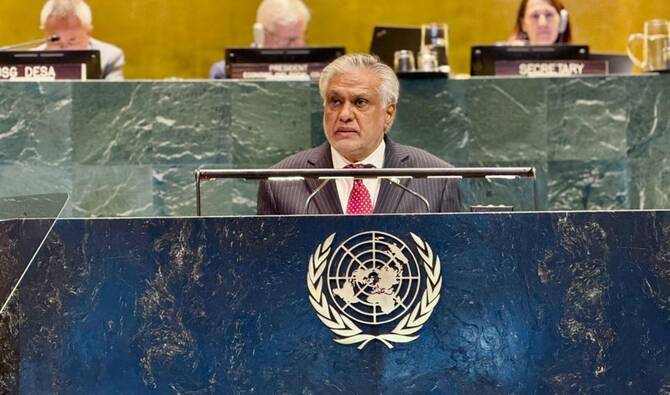In a powerful address at the United Nations High-Level Political Forum (HLPF), Deputy Prime Minister Ishaq Dar made a resounding call for urgent and transformative reform of the global financial architecture. Representing Pakistan on the world stage, Dar emphasized that developing nations cannot meet Sustainable Development Goals (SDGs) without bold, systemic changes to how international finance is structured and distributed.
The message was clear: national efforts alone are not enough. Without global support, particularly through restructured financing and fair debt practices, many developing countries—including Pakistan—will fall further behind on their development targets.
The Alarming Reality: SDGs Are Off-Track
During his address, Dar highlighted that only 35% of the global SDG targets are currently on track. He pointed to a series of interlocking crises that have significantly reversed development progress in vulnerable nations: the lingering effects of the COVID-19 pandemic, global supply chain disruptions, energy and food price shocks, and increasing climate-related disasters.
These challenges have hit developing countries the hardest, widening inequality, pushing millions back into poverty, and threatening the stability of already fragile economies. The deputy prime minister emphasized that the dream of global development is at serious risk unless the international community steps up.
Three Pillars of Reform: Pakistan’s Proposals
To address the growing financial disparities and systemic limitations, Pakistan proposed a comprehensive three-pronged strategy for reforming global financial systems:
1. Expanded Access to Concessional and Grant-Based Financing
Pakistan stressed the importance of enabling low- and middle-income countries to access affordable finance. Current lending frameworks, often dominated by high interest rates and rigid conditions, restrict developing nations from investing in social services, infrastructure, and climate adaptation. Ishaq Dar called for expanding access to zero- or low-interest loans and non-repayable grants through international financial institutions.
2. Meaningful and Targeted Debt Relief
Rising sovereign debt is a growing concern for many countries in the Global South. Dar demanded structured and meaningful debt forgiveness programs that allow governments to redirect resources from debt servicing to development. He also urged multilateral agencies and creditors to restructure existing debt in ways that foster economic stability, not austerity.
3. Significant Increase in Climate Finance
Highlighting the growing threat of climate change, Pakistan reiterated the urgent need for rich nations to fulfill their promises of climate financing, particularly for adaptation, loss and damage, and resilience-building. Developing countries like Pakistan among the most affected by climate events despite contributing the least to global emissions require direct support to invest in renewable energy, sustainable agriculture, and disaster preparedness.
Pakistan’s Domestic Efforts: Aligning Actions with Vision
Pakistan’s call for international reform is not without domestic action. The country has already undertaken several structural initiatives to demonstrate its commitment to sustainable development:
- 60% renewable energy target by 2030, showing its green transition ambitions
- Progress on revising nationally determined contributions (NDCs) for climate adaptation and mitigation
- Implementation of fiscal and economic reforms to ensure macroeconomic stability and improve financial governance
These domestic steps serve as the foundation for Pakistan’s argument: nations doing their part internally must be met with global structural support.
The Seville Framework: A Global Roadmap
Ishaq Dar also voiced strong support for the Compromiso de Sevilla (Seville Commitment), a recently introduced global framework that advocates for bold action in bridging SDG financing gaps, advancing debt justice, and restructuring international financial institutions. He urged UN member states to move beyond rhetoric and begin immediate implementation of this framework to salvage what remains of the 2030 Agenda.
The Bigger Picture: A Fight for Economic Equity
Pakistan’s position resonates with a broader consensus emerging among Global South countries. For decades, international financial institutions have operated under rules that disproportionately benefit wealthy nations, while imposing burdensome conditions on developing ones. This imbalance not only stalls growth but also erodes trust in the multilateral system.
Through its stance at the UN, Pakistan is advocating for:
- Equal representation for developing countries in global financial decision-making
- New criteria for credit ratings and lending that recognize development challenges rather than penalize them
- Democratization of global economic governance, including reform of boards and voting systems within institutions like the IMF and World Bank
Conclusion: Time for Action, Not Promises
Pakistan’s call for global financial reform is not just a diplomatic gesture it is a moral and developmental imperative. Without immediate and meaningful change, the world risks abandoning its collective promise to “leave no one behind.”
As global leaders continue to meet and deliberate, Pakistan’s message stands as a reminder: no nation can succeed alone in a broken financial system. The world must unite to build a fairer, more inclusive global economy one that empowers every country to meet its sustainable development goals with dignity and strength.



Comments (0)
No comments yet. Be the first to comment!
Leave a Comment